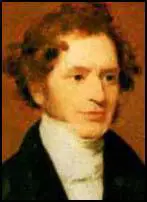14th Earl of Derby

Edward Stanley, the son of the 13th Earl of Derby, was born at Knowsley Park, Lancashire in 1799. He was educated at Eton and Christ College, Oxford and entered parliament for Stockbridge in 1820. The seat had been purchased for him by his father from Joseph Barham, a West Indian planter who was in financial difficulties.
Stanley supported the Whigs in Parliament but did not make a speech during his four years in the House of Commons. In 1826 he moved from Stockbridge to Preston, a constituency where one of the candidates was selected by the Derby family and the other by the people of the town.
Although a supporter of the Whigs, Stanley agreed in 1827 to join the Tory government led by George Canning. Stanley became under secretary of the colonies and retained the post under the next Prime Minister, Lord Goderich. However, Stanley considered the Duke of Wellington too reactionary and refused to serve in his administration (1828-1830).
Stanley returned to government in 1830 when he accepted the post of chief secretary of Ireland under the Whig Prime Minister, Earl Grey. Stanley did not share Grey's enthusiasm for parliamentary reform and was one of the main reasons why he was defeated at Preston by Henry Orator Hunt in the election that was held that year. He was not out of the House of Commons for long and he returned as MP for Windsor in February 1831.
Stanley's views become more conservative as he grew older and by 1833 considered Earl Grey to be too radical. In May of that year he left the government and became the leader of a group of about fifty independent MPs who obtained the name Stanleyites.
In 1841 Stanley agreed to join the Conservative government led by Robert Peel. Stanley became colonial secretary and was responsible for the Canadian Corn Bill. However, he disagreed with the policy of Sir Robert Peel to repeal the Corn Laws in Britain. Stanley now became one of the leader of the group that became known as the Protectionists.
In 1851 Stanley succeeded his father as 14th Earl of Derby. When the leader of the Whigs, Lord John Russell, resigned as Prime Minister in 1852, the Earl of Derby tried to form a government. Several leading figures, including Lord Palmerston and the Duke of Wellington refused to join the administration. One man who did accept a post was his son, Edward Stanley, who became under secretary for foreign affairs. When the House of Commons defeated his budget proposals in December 1852, he resigned.
Six years later the Earl of Derby returned as head of a minority government. Benjamin Disraeli, Derby's Chancellor of the Exchequer, suggested that Conservatives should extend the franchise. Disraeli told Derby that "our party is now a corpse, but it appears to me that, in the present perplexed state of affairs, a Conservative public pledge to parliamentary reform, a bold and decided course, might not only put us on our legs, but greatly help the country." Derby rejected the idea and as his own son, Edward Stanley, said to Disraeli, "he does not care for office, but wishes to keep things as they are and impede progress." In February 1858, Derby's government resigned after losing a vote of no confidence.
In 1866 the Earl of Derby became Prime Minister for a third time. Benjamin Disraeli, the new leader of Hose of Commons, pointed out that although attempts by Lord John Russell and William Gladstone to extend the franchise had failed, he believed that if the Liberals returned to power, they would certainly try again. Disraeli argued that unless the Conservatives took action they were in danger of being seen as an anti-reform party. This time Derby accepted Disraeli's arguments and in 1867 his government proposed a new Reform Act. Although some members of the Cabinet such as Lord Carnarvon and Lord Cranborne (later the Marquis of Salisbury) resigned in protest against this extension of democracy, the 1867 Reform Act was passed.
By 1868 the Earl of Derby was in poor health and he was forced to retire from office and was replaced by Benjamin Disraeli. Edward Stanley, 14th Earl of Derby, died later that year.
